- Expert advice/
- Fashion & beauty/
- Wedding Hair & makeup/
- Who Pays for Bridesmaid Hair & Makeup?
- Wedding Hair & makeup
Who Pays for Bridesmaid Hair & Makeup?
What’s the proper etiquette to getting bridesmaid hair and makeup done on the big day? Read on to find out.
Last updated February 5, 2024

The First Look ✨
- There’s no universal answer when determining who should pay for bridesmaid hair and makeup.
- There are a number of factors that you’ll want to consider—most notably the financial situation of everyone involved.
- Regardless of who is actually covering the costs, as the bride, you should be in charge of making sure that the bridal hair and makeup team get paid.
As a couple planning a wedding, there are a lot of things that you need to work into your wedding budget—you need to pay for the wedding venue, the wedding caterer, the wedding flowers, the bachelor and/or bachelorette party… it’s a lot to think about!
But, while most of the things you, as the couple, have to pay for are pretty clear, there are a few wedding-related expenses that feel more like a question mark—and that includes the bridesmaid hair and makeup.
When it comes to getting bridesmaid hair and makeup, what’s the proper etiquette? Is it a cost that the bridesmaids cover themselves—or is the bride supposed to cover the bill?
Let’s take a deep dive into all things bridesmaid hair and makeup—including who pays for it, how to pay for it, and what to do if there’s a disagreement over who should pay for it:
Table of Contents:
- Does the bride pay for the bridesmaid's hair and makeup—or do the bridesmaids pay for themselves?
- Things to consider when determining who is going to pay for bridesmaid hair and makeup.
- Different payment scenarios for bridesmaid hair and makeup.
- What to do if there’s a disconnect over who pays for bridesmaid hair and makeup.
- Who pays the hair and makeup team?
Does the Bride Pay for the Bridesmaid Hair and Makeup?
Let’s jump right into it. When it comes to bridesmaid hair and makeup, who’s responsible for payment—the bride or the bridesmaid? The answer is that it depends.
We wish there was a definitive answer (“the bride always pays for their bridesmaids’ hair and makeup!” or “the bridesmaids always pay for their hair and makeup!”), but the truth is, there’s no one-size-fits-all approach. In some scenarios, it makes sense for the bride to cover all the hair and makeup expenses for her wedding party. In other scenarios, it makes more sense for the wedding party to cover their hair and makeup costs. And, in other scenarios, the bride might cover part of the expenses, with the bridesmaids footing the rest of the bill.
So, the question is—how do you determine which scenario is the most appropriate for your wedding?
Things to Consider When Determining Who Is Going to Pay
When it comes to deciding who pays for bridesmaid hair and makeup costs—the bride or the bridesmaids—there are a few things that you’ll want to consider, including:
Your—and Your Wedding Party’s—Financial Situation
The biggest factor you’ll need to take into consideration when ironing out the details around who is going to pay for bridesmaid hair and makeup is the current financial situation of both yourself and your bridesmaids.
If you know that one—or all—of your bridesmaids are struggling financially, you may not feel comfortable asking them to shell out additional funds to get glammed up for your wedding. And, in that scenario, it would make sense for you to cover their hair and makeup costs.
On the flip side, if you’re the one who is struggling to cover wedding costs, while your bridesmaids are all doing well financially, it wouldn’t make sense for you to go into debt to cover their wedding day hair and wedding makeup. Therefore, in that scenario, it would make sense for them to cover their costs.
The point is when deciding who should pay for hair and makeup—the bride or the bridesmaids—it’s important to consider everyone’s financial situation.
Hair and Makeup Costs
Another factor that comes into play when figuring out who should cover bridesmaid hair and makeup is the actual cost of the service.
For example, let’s say that you book a hair and bridal makeup team at a significantly higher price point than most—and insist that your bridal party uses that beauty team. Because you’re choosing the most expensive option—and not giving your bridesmaids any less expensive alternatives—you should foot the bill.
On the flip side, if you give your bridesmaids free rein to choose whatever hair and makeup option work for their budget (for example, hitting a blow-dry bar before heading to your wedding venue), then it’s appropriate to ask them to cover the cost of their wedding hairstyle.
Other Costs
Before deciding whether your bridesmaids should pay for their hair and makeup, it’s important to consider what other costs they’ve had to cover—and whether adding another cost to their tab is the right move.
For example, if you decided to host a destination wedding—and your bridesmaids have already shelled out hundreds (or thousands!) of dollars for flights, hotels, and wedding-related excursions, then you might want to consider paying for their hair and makeup as a thank you. On the flip side, if you’re having a low-key wedding in your backyard—and your bridesmaids haven’t had any significant expenses associated with your wedding—then it’s probably appropriate to ask them to cover their hair and makeup costs.
Expectations Around Payment
Some bridesmaids accept the job under the assumption that the bride is going to pay for certain things—including hair and makeup. And while your bridesmaids’ expectations certainly don’t have to dictate whether you pay for their hair and makeup, it’s something to keep in mind.
Also, if at any point you told your bridesmaids that you would be paying for their hair and makeup, you’ll want to live up to the expectation that you set and cover the costs.
Different Payment Scenarios for Bridesmaid Hair and Makeup
There is not a yes or no answer to the questions “should the bride pay for the bridesmaids’ hair and makeup?” or “should the bridesmaids pay for their hair and makeup?” The truth is, depending on any of the factors above, several different scenarios could apply—some that have the bride covering the costs, some that have the bridesmaids covering the costs, and some that have them splitting the costs.
Some of the different payment scenarios for bridesmaid hair and makeup include:
The Bride Pays for All the Bridesmaid Hair and Makeup Costs
One of the two most common payment scenarios for bridesmaid hair and makeup is the bride covering all the costs.
This scenario makes sense when the bride has the budget to cover the costs, and/or knows the bridesmaids don’t have the cash on hand to cover their hair and makeup. This scenario is also appropriate if the bride insists on going with hair and makeup wedding vendors that are significantly more expensive than other available options.
The Bridesmaids Pay for All Their Hair and Makeup Costs
The other most common payment scenario for bridesmaid hair and makeup is the bridesmaids covering the costs themselves.
This scenario makes sense when the bridesmaids are both willing and financially able to pay for their hair and makeup, and/or the bride is working with a limited wedding budget. This scenario is also appropriate if the bride gives the bridesmaids flexibility over their hair and makeup (for example, letting them choose their hairstylist or tapping a friend that’s a makeup artist to do their makeup for a steep discount).
Some Bridesmaids Pay for Themselves, While the Bride Covers the Others
Having the bride pay for all the bridesmaid's hair and makeup—or having all the bridesmaids cover their hair and makeup costs—is generally the easiest way to do it. But, if most of the bridesmaids are willing and able to pay for their hair and makeup—except for one or two that are struggling financially—it could make sense for the bride to cover costs for only those bridesmaids (while the rest of the wedding party covers their costs).
(If you decide to go with this payment scenario, just keep in mind that it probably makes sense to keep the fact that you’re paying for certain bridesmaids between you and those bridesmaids; otherwise, it could lead to feelings of resentment from the other bridesmaids who are covering their costs.)
The Bride and the Bridesmaids Split the Cost
Another option for paying for bridesmaid hair and makeup is splitting the cost between the bride and the bridesmaids.
For example, you could split the cost right down the middle, with the bride covering 50 percent and each bridesmaid covering the other 50 percent. Or, you could have the bride pay for hair, while the bridesmaids pay for makeup (or vice versa).
This payment can be a great compromise, as the full cost burden doesn’t fall on the bride or the bridesmaids’ shoulders—making the costs easier to manage for both parties.
No One Pays for Professional Hair and Makeup
If budget is an issue for both the bride and the bridesmaids, taking a DIY approach to hair and makeup—which has little to no cost for everyone involved—could be the best option.
Who Pays the Hair and Makeup Team?
If you’re using a wedding beauty team to glam up your bridesmaids (versus your bridesmaids going to an independent salon, stylist, or artist—or managing their hair and makeup), as the bride, YOU should be the one to pay them, even if the money is coming from the bridesmaids.
The last thing that your hair and makeup vendors want to do is manage multiple payments from bridesmaids—and keep track of who has paid, who hasn’t, and how much they need to collect.
If you’re paying for your bridesmaids’ hair and makeup, pay the hair and makeup artists directly. If your bridesmaids are paying for their hair and makeup, have them give the money to you before your wedding, and then pay the hair and makeup artists directly.
What Happens If There’s a Disconnect Over Who Pays?
Ideally, you and your bridesmaids will agree on who should foot the bill for hair and makeup. But, what happens if you don’t agree? What if your bridesmaids think that you should cover their hair and makeup costs—and you were hoping that they’d pay for hair and makeup themselves?
This can be a sticky situation. As the bride, you can explain to your bridesmaids why you want or need them to cover their hair and makeup costs—but ultimately, you can’t force them to pay.
So, what do you do in that situation?
If your bridesmaids think that you should pay for their hair and makeup costs—and you disagree—you have a few options. If you can find wiggle room in your budget, you can decide to cover the costs—even if it’s not something you want/think you should have to do. If you don’t have the cash, you can let your bridesmaids know that they’ll be doing their hair and makeup for your wedding. Or, if you’re adamant about them having their hair and makeup done professionally, you can let them know that paying for hair and makeup is one of your non-negotiable bridesmaid responsibilities—and if they’re not willing to do it, unfortunately, they won’t be able to be a part of the wedding party.
Ultimately, you have to navigate any disagreements over who should pay for what—including bridesmaid hair and makeup—in a way that feels right to you. Just remember that you asked these people to be at your wedding party because they’re important to you, so make sure that you navigate the conversation in a way that preserves your relationship after the wedding is over.
Get Clear on Who Pays from the Get-Go
Now that you know everything that goes into determining who pays for bridesmaid hair and makeup, you’re armed with the information that you need to make the right decision for you, your wedding party, and your wedding. Decide who will be paying for bridesmaid hair and makeup as early as possible in the wedding planning process, so that you can let your bridesmaids know what hair and makeup costs they will (or won’t) need well in advance of your wedding. This will also ensure that there won’t be any disagreements or misunderstandings on who pays for what on the big day.
Up next for you
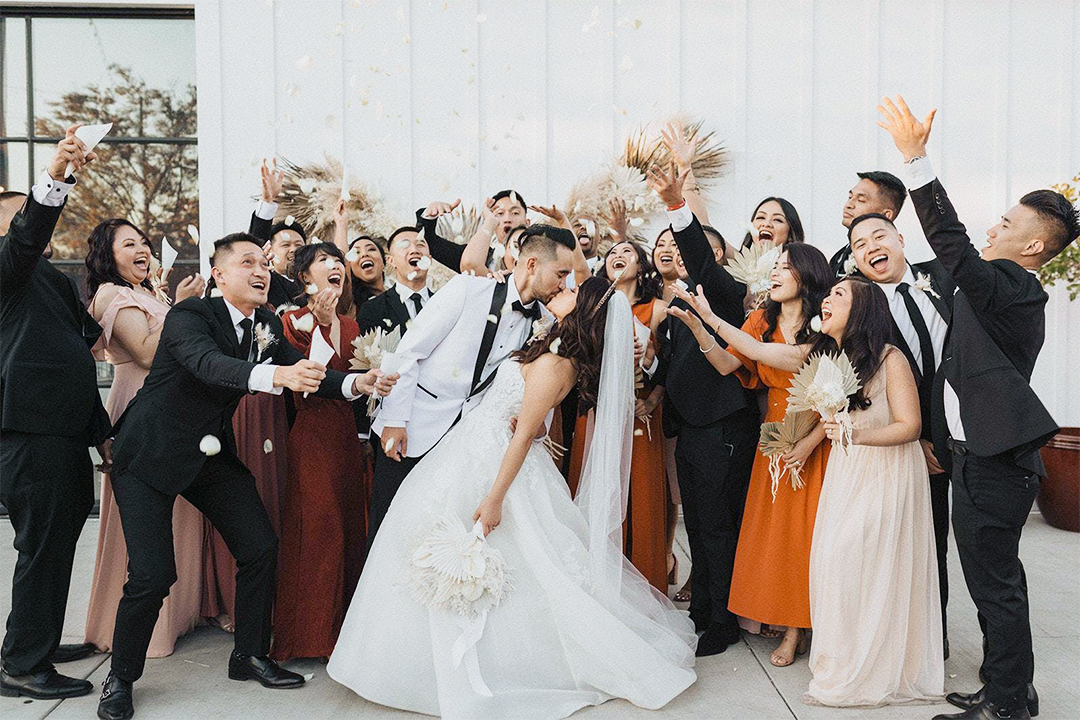
Wedding Coordinator Tips & Tricks: How to Prepare For the Big Day
Inspiration
We’re walking you through when to book a wedding coordinator, and more importantly, what you need to know before you book.
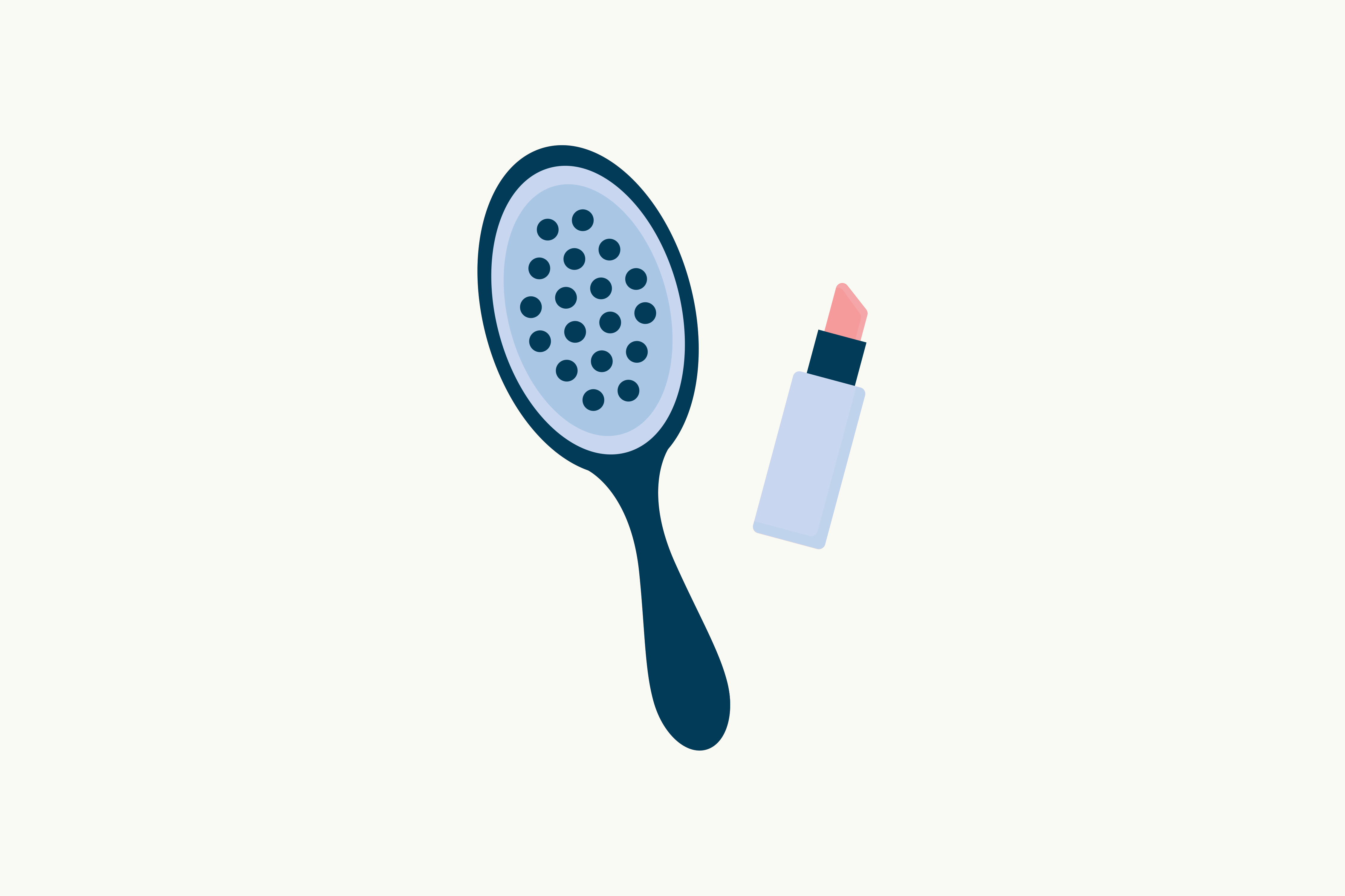
Wedding Hair Stylists and Makeup Artist Dos and Don'ts
Advice
Makeup artists and hairstylists have a huge role in making the bride feel beautiful. Continue reading for insider wedding tips from these beauty professionals.
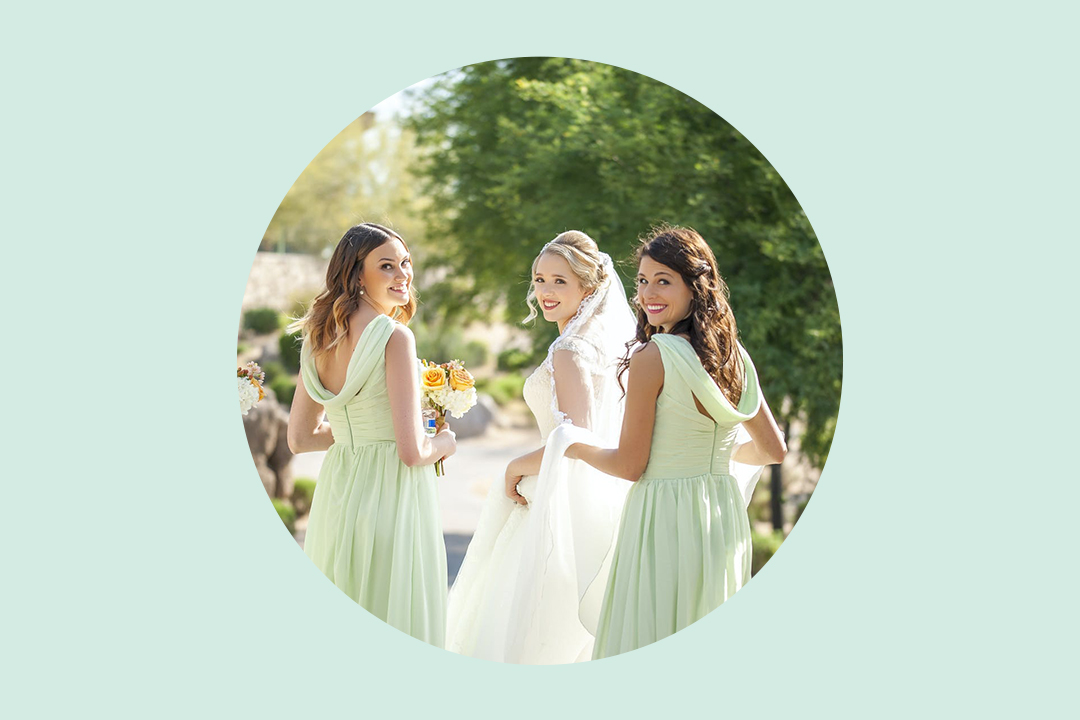
Who Pays for Bridesmaid’s Dresses?
Advice
Not quite sure who should be paying for the bridesmaid's dresses at your wedding? Read our guide to our expert advice.
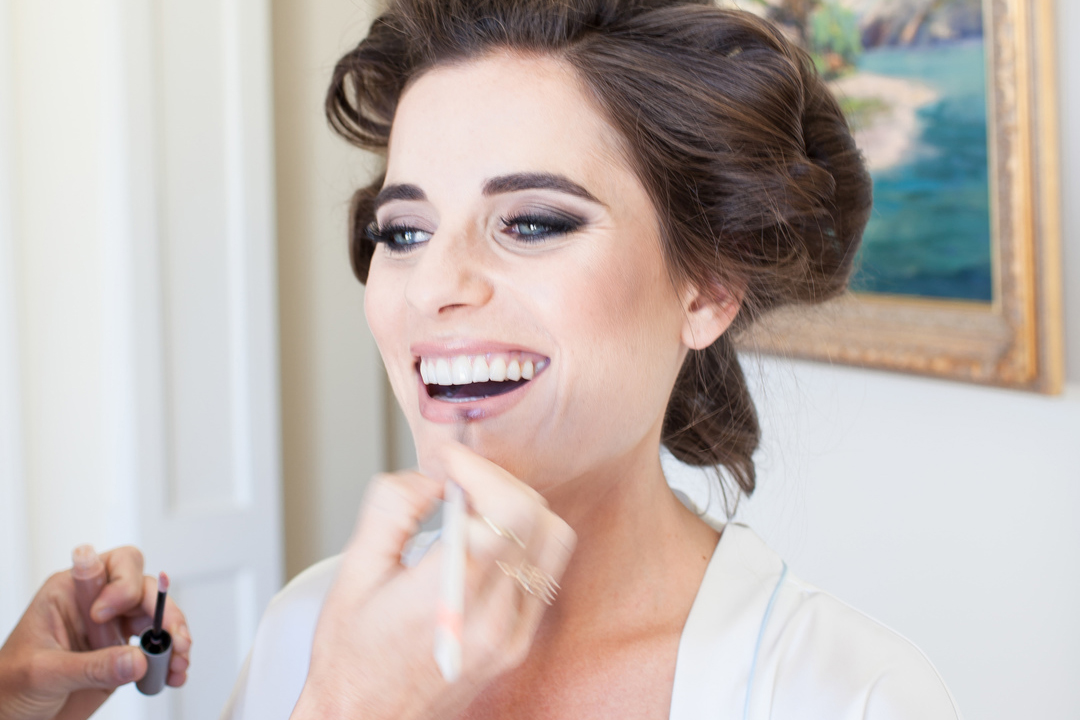
6 Effective Ways to Test Your Wedding Makeup
How To
Make sure your wedding makeup stands up to your celebration. Here is exactly how to test your wedding makeup and what to look for as you do.
Featured

Should You Use Airbrush Makeup on Your Wedding Day?
Advice
Airbrush makeup has become a popular choice for brides everywhere. We dive into the benefits of airbrush makeup, here.
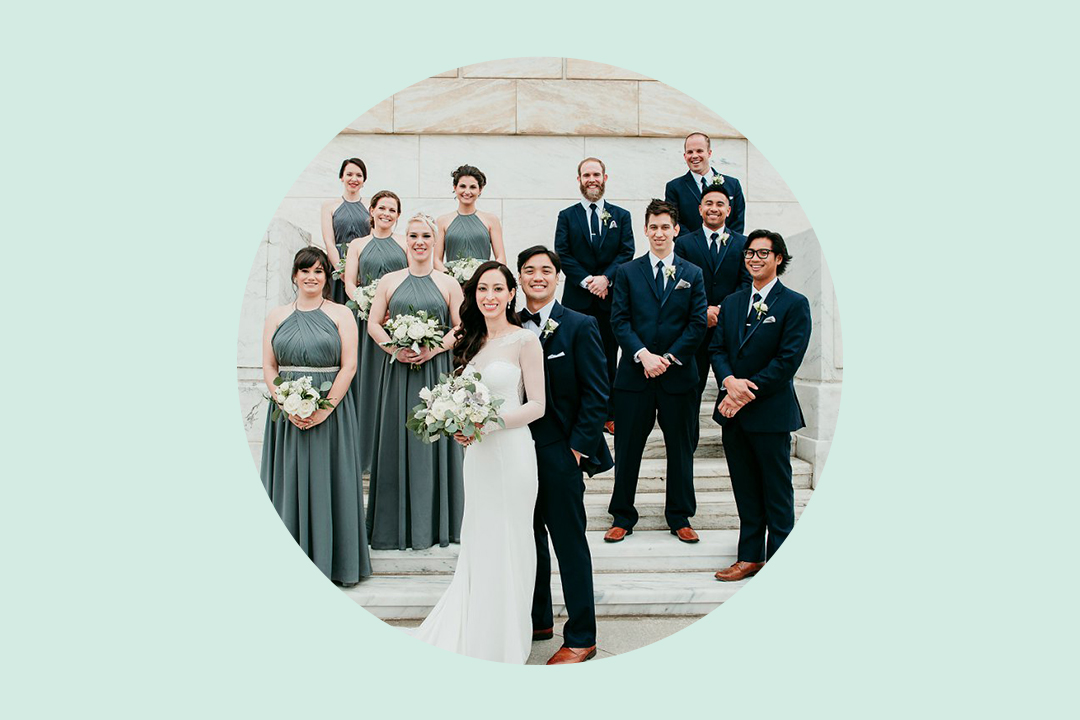
How Many People Should Be In Our Wedding Party?
Advice
You want to include everyone in your wedding party, but you know you can't. If you're having a hard time deciding who and how many, here's exactly how to figure out how many people should be in your wedding party.
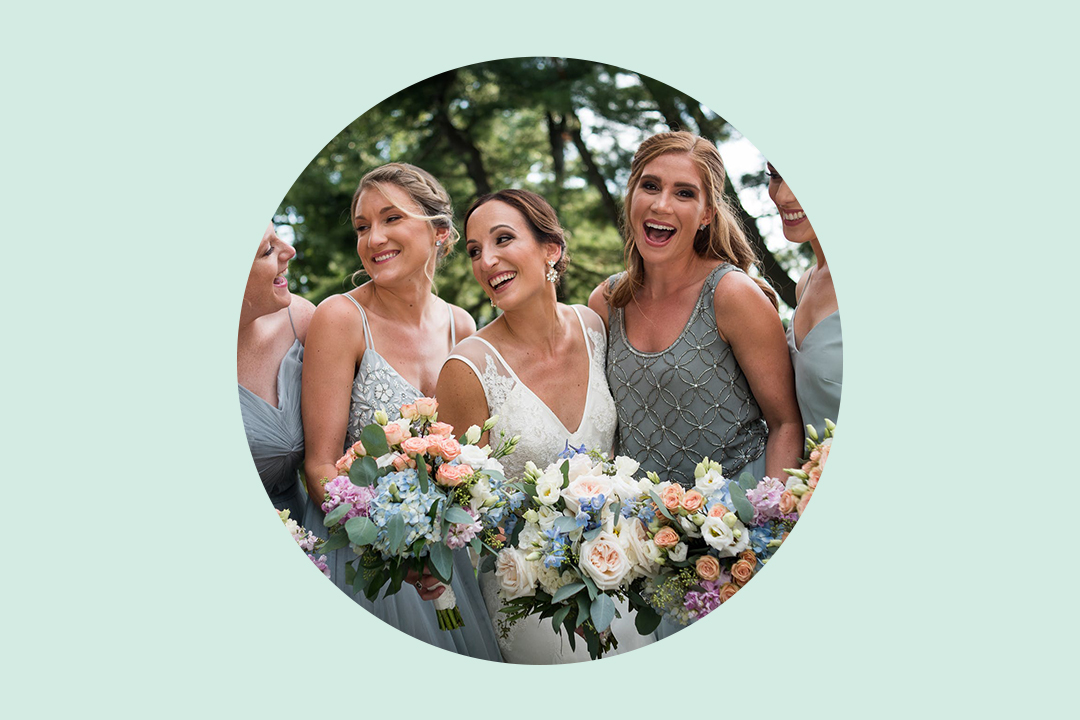
The Bridesmaid Duties: A Full Breakdown
Inspiration
Being a bridesmaid means agreeing to a fairly long list of responsibilities. We’ve put together a comprehensive list of bridesmaid duties.

The Ultimate Wedding Day Emergency Kit List
Inspiration
Check out Zola's ultimate wedding day emergency kit, and be ready for anything on your special day. Don't worry, we've thought of everything.
- Expert advice/
- Fashion & beauty/
- Wedding Hair & makeup/
- Who Pays for Bridesmaid Hair & Makeup?
Find even more wedding ideas, inspo, tips, and tricks
We’ve got wedding planning advice on everything from save the dates to wedding cakes.
